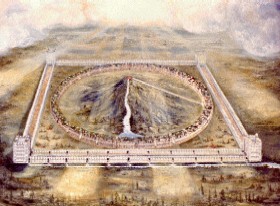Loading AI tools
Book of Ezekiel, chapter 47 From Wikipedia, the free encyclopedia
Ezekiel 47 is the forty-seventh chapter of the Book of Ezekiel in the Hebrew Bible or the Old Testament of the Christian Bible.[1][2]
| Ezekiel 47 | |
|---|---|
 Book of Ezekiel 30:13–18 in an English manuscript from the early 13th century, MS. Bodl. Or. 62, fol. 59a. A Latin translation appears in the margins with further interlineations above the Hebrew. | |
| Book | Book of Ezekiel |
| Hebrew Bible part | Nevi'im |
| Order in the Hebrew part | 7 |
| Category | Latter Prophets |
| Christian Bible part | Old Testament |
| Order in the Christian part | 26 |
This book contains the prophecies attributed to the prophet/priest Ezekiel,[3] and is one of the Books of the Prophets.[4][5] The final section of Ezekiel, chapters 40-48, gives the ideal picture of a new temple. The Jerusalem Bible refers to this section as "the Torah of Ezekiel".[6]
This chapter contains Ezekiel's vision of the holy waters (Ezekiel 47:1-5) and their virtue (verses 6–12), the borders of the land (verses 13–21) and the division of the land by lot (verses 22–23).[7] The vision was given on the 25th anniversary of Ezekiel's exile, "April 28, 573 BCE";[8] 14 years after the fall of Jerusalem and 12 years after the last messages of hope in chapter 39.[9]
The original text was written in the Hebrew language. This chapter is divided into 23 verses.

Some early manuscripts containing the text of this chapter in Hebrew are of the Masoretic Text tradition, which includes the Codex Cairensis (895), the Petersburg Codex of the Prophets (916), Aleppo Codex (10th century), Codex Leningradensis (1008).[10]
There is also a translation into Koine Greek known as the Septuagint, made in the last few centuries BC. Extant ancient manuscripts of the Septuagint version include Codex Vaticanus (B; B; 4th century), Codex Alexandrinus (A; A; 5th century) and Codex Marchalianus (Q; Q; 6th century).[11][a]
The portrayal of 'paradise regained' in this section concludes the original vision account, as Ezekiel from a location outside the eastern gate observes water flowing eastward from the temple complex, becoming a broad and swift-flowing stream that provides life for the barren dessert and sweetens the waters of the Dead Sea.[13]

"He" refers to the man whose appearance was like bronze in Ezekiel 40:3, Ezekiel 46:19 and Ezekiel 47:3.[15]
The river flows into the River Jordan, to the east, and then into the Red Sea.[17]

This section and the next chapter deal with the distribution of the land among the tribes of Israel, in a highly idealized scheme and with some place names that have not been identified with certainty.[18]
Seamless Wikipedia browsing. On steroids.
Every time you click a link to Wikipedia, Wiktionary or Wikiquote in your browser's search results, it will show the modern Wikiwand interface.
Wikiwand extension is a five stars, simple, with minimum permission required to keep your browsing private, safe and transparent.